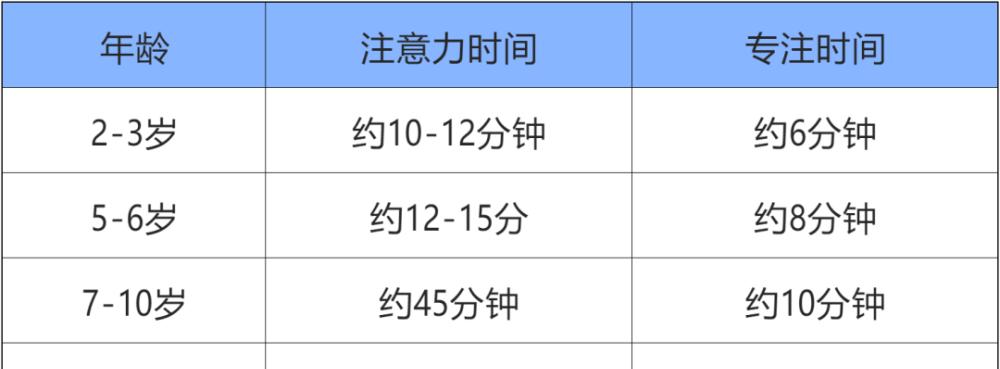Concentration is the child
The cornerstone of the road to success
Playing with toys is only 3 minutes hot?
Too many ideas, always idle?
Why is it inattentive?
··· ···
I believe that many mothers have such doubts, how can a good baby not sit still? In fact, whether the baby can concentrate on the things at hand is mainly determined by concentration.
In fact, it is normal for children!
Psychologists have observed and studied that in general, in a good educational environment, the average duration of concentration is as follows:

Your baby is not up to standard
According to the data, it can be found that children's concentration is not innate, and as they grow older, the concentration time will gradually increase.
1
Manifestations of insufficient concentration
Because the large multifunctional area of the child's brain has not yet matured, it is more common for children (especially children in the younger age group) to have insufficient concentration, and its manifestations are also diverse, but in general, it can be divided into three categories:
01 Easy to be distracted and affected:
The child may have been doing something very seriously, but as long as there is any wind and grass next to him, his attention can easily be drawn to it.
02 Difficult to focus on for a long time, short focus time:
Some children may have trouble concentrating on one thing, or they may have lost their minds after less than a few minutes of concentration.
03 The self-control is relatively poor:
Just like we adults, for example, the mobile phone suddenly came to a WeChat, and then interrupted the work that was being focused and went to brush the mobile phone.
Children with good concentration can generally suppress the stimulation and temptation of the outside world, and in the process of learning, even if something interesting and new appears, they can control their impulses and continue to focus on the work in front of them.
2
Factors that affect your child's concentration
01 Parents are overly concerned about the interruption
Some parents often pay too much attention to their children when they play seriously:
Oops, how come hands are so dirty?!
Baby, drink some water and play again~
Tired is not tired, I will play it again later
In fact, although parents intervene with the mentality of caring for their children, they will interrupt the continuity of their children's concentration. Over time, the child's concentration will naturally not be exercised.
It is recommended that parents ensure that in the case of safety, please give the child an appropriate independent space and let the child explore the things that interest them in their own way.
02 Often urge and criticize children
How can it be so slow to learn
How can I not play well now
Hurry up, don't play
When parents urge and criticize their children, they are often accompanied by roars and accusations, which will make the children feel anxious and inhibit the child's ability to think and retain memories. It can put the child in a state of tension, resulting in difficulty concentrating, inefficient completion, and poor quality.
It is recommended that if time permits, give them enough space and time so that they can think quietly and ponder freely.
03 Too many toys
Too many toys at home can also make your baby less focused. The newly purchased doll-catching machine is not fully familiar, I saw the electric car, and the child always wants to play with this and play with that. Therefore, if you want your baby to improve his concentration, you need to avoid these factors that affect your child's concentration.
In addition, the noisy environment is also an important factor in affecting children's concentration.
Try to create an orderly and quiet environment for your children at home.
3
A daily approach to developing concentration
In order to cultivate children's concentration, we must first understand what we want to cultivate and apply to which aspects.
There are five dimensions of concentration, namely: persistence (how long to focus), concentration (whether it is quick to focus), transfer (whether it is easy to transfer), distribution (concentration is assigned to multiple things), and breadth (focus on the amount of information).
For children, we pay more attention to the three dimensions of persistence, concentration and transfer of concentration, mainly persistence and transfer.
In daily life, it is mainly reflected in whether the child can sit still and not move, do not wander, and whether he can concentrate and effectively when learning and playing.
Then our guidance should revolve around these points:
Ask for a quiet seat,
Be able to mobilize children to take the initiative to pay attention and think,
Strong operability,
Activities that the child is interested in and that suits their abilities.
For example, the operable puzzles in life, tangram puzzles, wiring, coloring, finding differences, rope games, etc., are all games that cultivate good concentration.